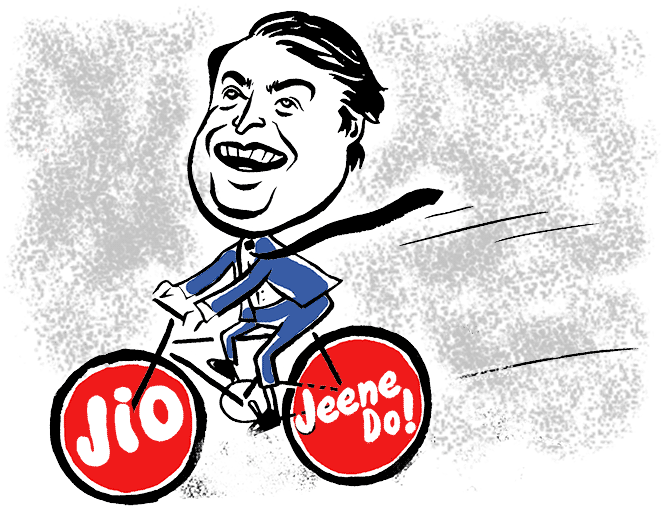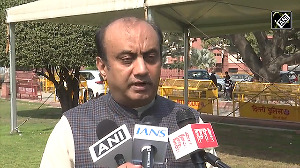Airtel and Vodafone Idea are also trying to expand the penetration of 4G users in their subscriber base as they take this network to the hinterland.
Illustration: Dominic Xavier/Rediff.com

As Reliance Jio narrows the gap with the older telecom majors in terms of active subscriber base, analysts now project that it would be focusing more on revenue growth.
October data on subscriber addition shows that after a three-month decline in net active subscribers, Bharti Airtel is back in the game, with 3.4 million more.
India Infoline (IIFL) analysts project that Jio is likely to capture 51 per cent revenue market share (RMS) in the next three years. Also, that with Airtel now vocal on a willingness to raise prices, it is up to Jio to take a lead in raising of rates.
“Jio is unlikely to hike tariffs (rates) at the moment. It would, however, strategise to increase revenue per customer, through driving content and other services.
"The only concern for Jio is that its subscriber base is stronger in non-metro markets, traditionally low-value customers. Jio is now making inroads in the metro and tier-I markets.
"This would be crucial in determining whether the momentum in subscriber addition would result in commensurate RMS gain,” said a Mumbai-based analyst.
At the end of the September quarter, Jio’s RMS had expanded to 26.1 per cent.
Airtel and Vodafone Idea had reported RMS of 30.9 per cent and 32.8 per cent, respectively.
The IIFL report also said: “Jio is unlikely to increase prices for the next few months but we are of the opinion that once it reaches the 40 per cent RMS mark (our projection is 51 per cent within the next three years), it will change focus to a combination of price hikes and RMS increase.
"Thereby creating an opportunity for acceleration in industry revenue growth. Calendar year 2020 should see this materialise.”
The sector recently saw its first rate change in the prepaid unlimited bundle segment after January 2018.
Last month, both Vodafone Idea and Airtel made changes to their flagship Rs 399 plan, while increasing prices of their 28-day validity plan.
“In essence, validity of the Rs 399 plan has been increased from 70 days to 84 days, while the daily data limit has been reduced from 1.4 GB to 1 GB.
"Bharti and Vodafone Idea's new Rs 399 plans are now comparable to Jio’s Rs 399 plan on validity, although Jio offers a 1.5 GB daily data limit,” noted UBS Securities.
Both older operators have also raised the price of their 28-day validity plan from Rs 149 to Rs 169.
The higher validity of the Rs 399 recharge plan (by Airtel and Vodafone Idea) narrows the price gap with Jio.
“It will be interesting to see how Jio responds, given its stated policy of offering greater value than competitors,” UBS analysts said.
Airtel and Vodafone Idea are also trying to expand the penetration of fourth-generation technology (4G) users in their subscriber base as they take this network to the hinterland.
“While these plans could potentially reduce average revenue per user (ARPU), it will be interesting to see if this can be cushioned with the positive ARPU impact from the 2G minimum recharge plans introduced in November,” a UBS analyst said.
Jio topped with 8.5 million in active subscriber addition in October (data from the Telecom Regulatory Authority of India).
Airtel added 3.4 million, bucking the previous three months’ down-trend.
Vodafone Idea, however, lost 2.9 million subscribers in the month, a sixth successive decline.
“In our view, this is an indication of consumers now starting to use Jio as their primary SIM card,” Motilal Oswal analysts said.












 © 2025
© 2025